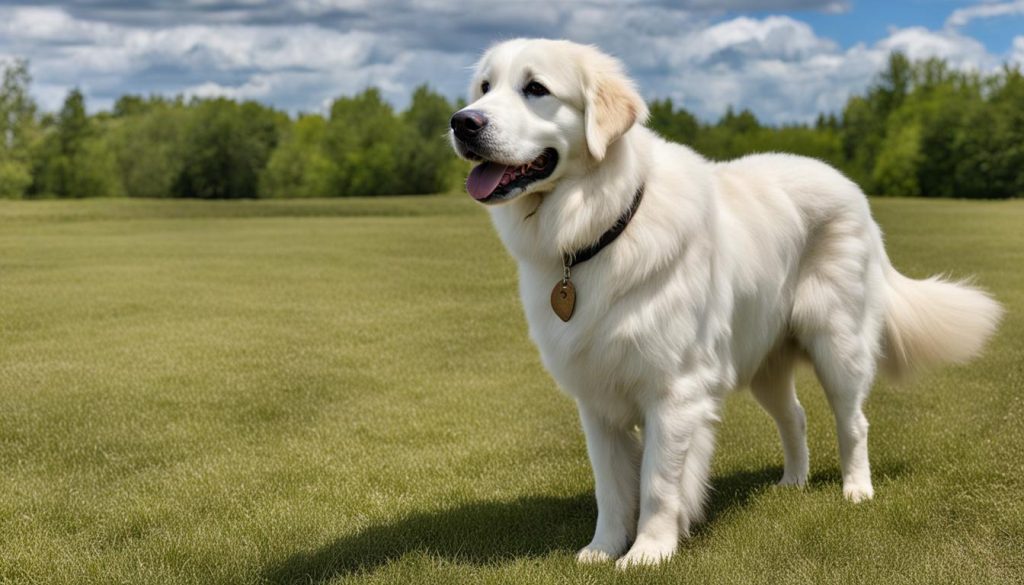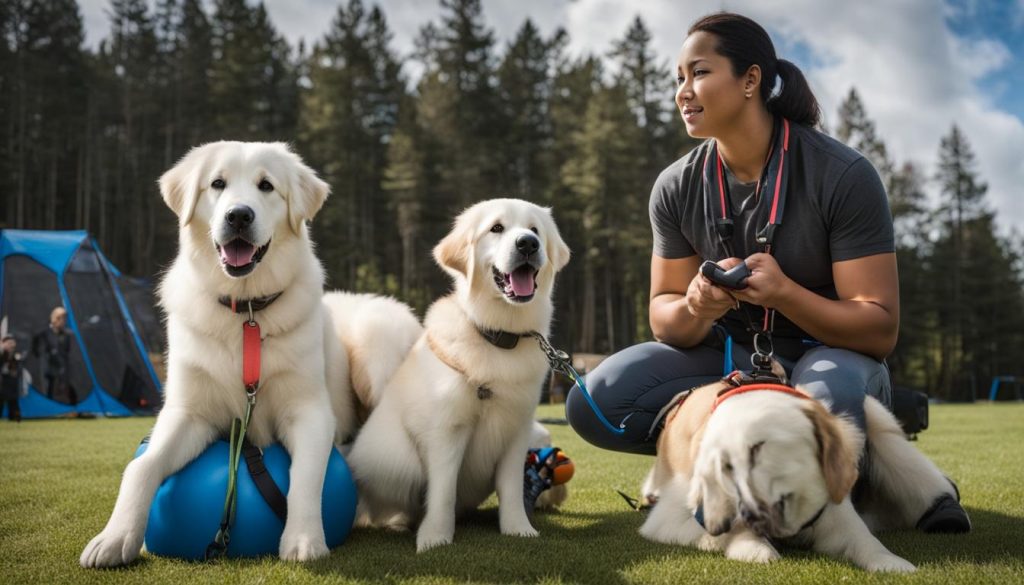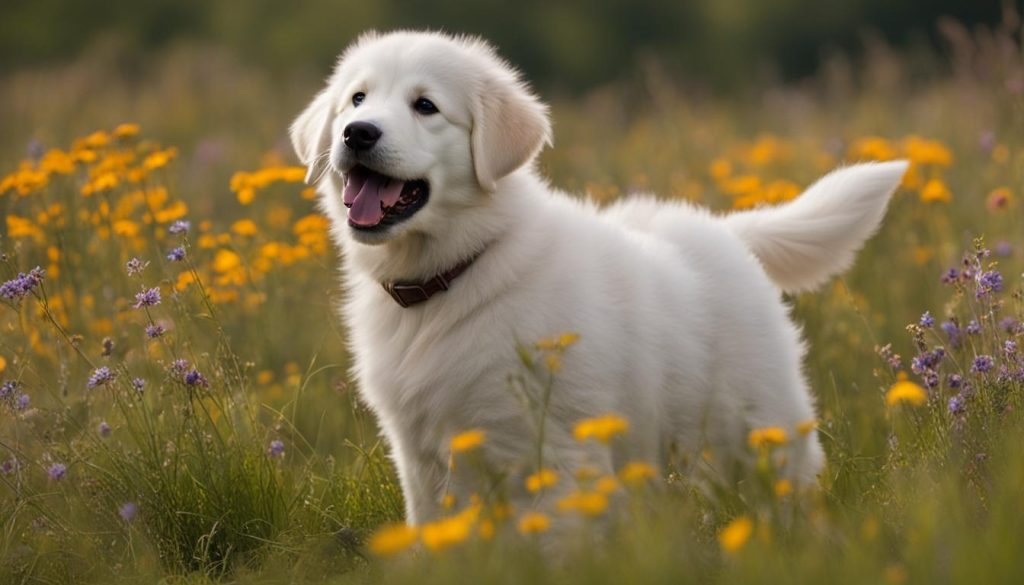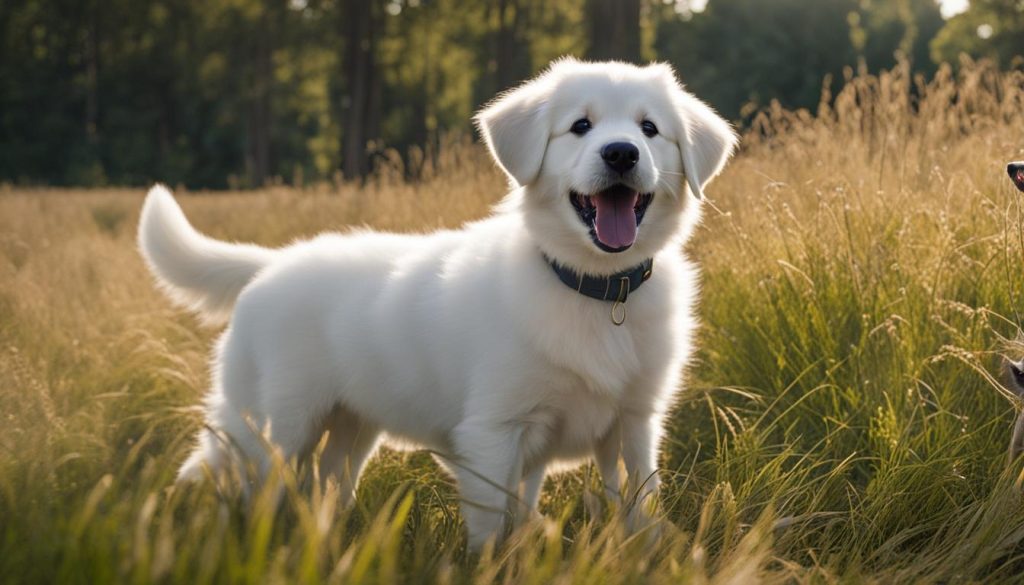Hello, welcome to my comprehensive guide on the Great Pyrenees Lab Mix, also known as the Pyrador. In this article, I will provide you with valuable information about this unique hybrid designer dog. The Pyrador is a crossbreed between the intelligent and active Labrador Retriever and the loyal and protective Great Pyrenees. Whether you’re considering getting a Pyrador or simply want to learn more about this fascinating breed, you’ve come to the right place.
Before we delve into the specifics, let’s explore some key takeaways:
Key Takeaways:
- The Great Pyrenees Lab Mix, or Pyrador, is a hybrid designer dog that combines the Labrador Retriever and Great Pyrenees.
- They require ample space and are better suited for active homes with plenty of time for exercise, training, and socialization.
- The Pyrador has a working history inherited from both parent breeds, with the Great Pyrenees as a livestock guardian and the Labrador Retriever as a retrieving dog.
- They have a unique physical appearance, with a large size, long muzzle, and a variety of coat colors.
- The Pyrador is known for its gentle, loyal, and intelligent temperament, but socialization and training are important for a well-rounded companion.
History and Original Purposes
The Great Pyrenees and Labrador Retriever, the parent breeds of the Great Pyrenees Lab mix, have rich histories and original purposes that contribute to the traits of this unique hybrid. The Great Pyrenees, originally from the Pyrenees Mountains, were bred as working dogs for shepherding and protecting livestock from predators like wolves and bears. Labrador Retrievers, on the other hand, were developed in Newfoundland, Canada, as retrieving dogs for fishermen.

The Great Pyrenees Lab mix inherits the working instincts and traits of both breeds. They have the loyal and protective nature of the Great Pyrenees, combined with the intelligence and retrieving skills of the Labrador Retriever. This mix of characteristics makes them versatile and adaptable, capable of excelling in various roles and environments.
Whether it’s herding, protecting, or retrieving, the Great Pyrenees Lab mix can fulfill a range of tasks, and their history as working dogs is evident in their temperament and abilities. Understanding the origins of this hybrid will help potential owners appreciate and meet the unique needs of the breed.
Appearance and Colors
The Great Pyrenees Lab mix, also known as the Pyrador, is a visually striking dog with a unique combination of physical traits inherited from its Great Pyrenees and Labrador Retriever parents. This crossbreed typically has a large and sturdy build, complemented by a long muzzle and floppy ears.
One of the most exciting aspects of the Great Pyrenees Lab mix is its coat colors. This hybrid can showcase a variety of hues, including black, yellow, chocolate, and various shades of white. The coat can be short or shaggy, depending on the genetic influence of the parent breeds. These beautiful coat colors make the Pyrador an eye-catching companion.
The size of a Great Pyrenees Lab mix can range from 22 to 32 inches tall and weigh between 55 to 100 pounds. Their stature and physical characteristics make them a pretty good presence in any setting. Whether they are trotting by your side or lounging with their floppy ears adorably on display, the Pyrador’s appearance is sure to turn heads.

Table: Great Pyrenees Lab Mix Appearance
| Characteristic | Description |
|---|---|
| Size | Ranges from 22 to 32 inches tall |
| Weight | Weighs between 55 to 100 pounds |
| Muzzle | Features a long muzzle |
| Ears | Has floppy ears |
| Coat | Variety of colors including black, yellow, chocolate, and various shades of white. Can have a short or shaggy coat. |
Temperament Traits
The Great Pyrenees Lab mix, also known as the Pyrador, is a gentle giant with a loyal and intelligent temperament. This hybrid breed combines the playful and energetic nature of the Labrador Retriever with the protective instincts of the Great Pyrenees. They make excellent family pets and are known for their affectionate and friendly nature.
The Pyrador is an intelligent breed that thrives on mental and physical stimulation. They are quick learners and respond well to positive reinforcement training methods. With early socialization and training, they can become well-rounded and obedient companions. However, you should note that they may have strong guarding instincts and may be wary of strangers. Proper socialization from a young age can help mitigate any potential fear-based aggression.
Due to their size and energy levels, the Great Pyrenees Lab mix requires regular exercise to prevent boredom-related destructive behaviors. They enjoy activities such as long walks, hikes, and playtime in a securely fenced yard. Mental stimulation, such as puzzle toys or training sessions, can also keep them engaged and prevent boredom. This breed thrives in active households that can provide them with ample exercise opportunities.
Temperament Traits
The Great Pyrenees Lab mix is a gentle giant known for its loyalty, intelligence, and playful nature. They make excellent companions for active families who can provide them with the exercise, training, and socialization they need. With the right upbringing, these dogs can be friendly, well-behaved pets that bring joy to their owners.
- Gentle Giant: The Great Pyrenees Lab mix is a large and gentle breed, known for its calm and patient demeanor.
- Loyal: Pyradors are extremely loyal and form strong bonds with their families. They are protective and will go to great lengths to keep their loved ones safe.
- Intelligent: This hybrid breed is highly intelligent and eager to please. They are quick learners and excel in obedience training.
- Energetic: The Pyrador is an active dog that requires regular exercise to stay happy and healthy. They enjoy physical activities and mental stimulation.
- Playful: Despite their large size, Pyradors have a playful and fun-loving nature. They enjoy interactive playtime and engaging activities with their owners.
Overall, the Great Pyrenees Lab mix is a wonderful companion for families who are looking for an affectionate, loyal, and intelligent dog. With the right training, socialization, and exercise, they can thrive in a loving home environment.

Grooming and Shedding
The Great Pyrenees Lab mix, also known as the Pyrador, requires regular grooming to maintain a healthy coat and manage shedding. Both the Great Pyrenees and Labrador Retriever are known to shed, so be prepared for regular brushing to keep their coat in good condition.
Aim to brush your Pyrador at least once a week, or more frequently during shedding seasons. This will help remove loose fur and minimize the amount of hair around your home. Regular brushing also promotes healthy skin and coat, and it allows you to check for any skin issues or parasites.
In addition to brushing, care for your Pyrador’s nails and ears. Regular nail trimming prevents overgrowth and discomfort, while routine ear cleaning helps prevent infections. Proper grooming not only keeps your Pyrador looking their best, but it also contributes to their overall health and well-being.
| Grooming Needs | Frequency |
|---|---|
| Brushing | At least once a week |
| Nail trimming | As needed to prevent overgrowth |
| Ear cleaning | As needed, usually once a month |
Try to approach grooming sessions positively, using treats and praise to make it a pleasant experience for your Pyrador. If you’re unsure about proper grooming techniques or need assistance, consult a professional groomer or your veterinarian for guidance.
Exercise and Living Conditions
The Great Pyrenees Lab mix is an active and energetic dog breed that requires regular exercise to stay happy and healthy. Due to their size and energy level, they are best suited for homes with a large yard where they can have plenty of space to run and play. Daily exercise is essential to prevent boredom-related destructive behaviors and to maintain their overall well-being.
Engaging in activities such as daily walks, playtime, and interactive games will help stimulate their minds and burn off excess energy. You should note that exercise needs may vary depending on the individual dog’s age, health, and overall energy level. Consulting with a veterinarian or professional trainer can help determine the appropriate amount and intensity of exercise for your Great Pyrenees Lab mix.
Additionally, it is good practice to provide regular joint development exercises for your Great Pyrenees Lab mix to ensure their joints develop properly. When their joints are fully developed, you can engage in activities such as agility training, hiking, and swimming to further challenge and stimulate them physically and mentally.
| Exercise Needs: | Living Conditions: |
|---|---|
|
|
Providing your Great Pyrenees Lab mix with the appropriate exercise and living conditions will contribute to their overall well-being and help them lead a happy and fulfilled life. Additionally, regular exercise and mental stimulation will strengthen the bond between you and your furry companion, creating a harmonious relationship built on trust and shared experiences.

Training and Socialization
Training and socialization play vital roles in the development of a well-rounded Great Pyrenees Lab mix, also known as the Pyrador. These intelligent and loyal dogs require positive experiences and early socialization to ensure they grow up to be confident and friendly companions. Training techniques should focus on using positive reinforcement and fun activities to keep them engaged.
Early socialization is crucial for the Pyrador breed. Exposing them to various people, animals, and environments helps prevent fear-based aggression and promotes their ability to adapt to new situations. Introducing them to different settings, such as parks, busy streets, and public places, builds their confidence and teaches them how to appropriately interact with others.
Consistency is key when it comes to training the Great Pyrenees Lab mix. Establishing clear boundaries and rules from the beginning is essential to prevent any unwanted behaviors. By using positive reinforcement methods such as treats, praise, and play, owners can motivate their Pyrador to learn and follow commands. You should avoid harsh or punitive training methods, as this can lead to fear and aggression.
“Training a Pyrador can be a fun and rewarding experience. These dogs are eager to please and thrive when given clear guidance and positive reinforcement. Take the time to bond with your Pyrador through training sessions and provide plenty of mental stimulation to keep them happy and engaged.”
Training Tips for the Great Pyrenees Lab mix:
- Start training early to establish good behaviors and prevent the development of bad habits.
- Use positive reinforcement, such as treats and praise, to reward desired behaviors.
- Keep training sessions short and engaging, as the Pyrador can have a short attention span.
- Focus on basic obedience commands like sit, stay, and come, gradually progressing to more advanced training tasks.
- Ensure consistency in training methods and expectations to avoid confusion.
- Enroll in puppy classes or consult a professional dog trainer for additional guidance and support.

Training Techniques for the Pyrador
| Techniques | Description |
|---|---|
| Positive Reinforcement | Using rewards such as treats, praise, and play to reinforce desired behaviors. |
| Clicker Training | Pairing a sound (click) with a reward to mark and reinforce correct behaviors. |
| Marker Training | Using a specific word or sound to mark desired behaviors and communicate effectively with the dog. |
| Leash Training | Teaching the Pyrador to walk politely on a leash without pulling or lunging. |
| Socialization Exercises | Exposing the Pyrador to various people, animals, and environments to build their confidence and prevent fear-based aggression. |
By implementing these training techniques and providing early socialization, owners can help their Great Pyrenees Lab mix become well-behaved, happy, and confident dogs. Training should be a positive and enjoyable experience for both the owner and the dog, strengthening the bond between them and ensuring a harmonious life together.
Health
When it comes to the Great Pyrenees Lab mix, or Pyrador, be aware of the potential health issues that may affect this breed. Like any mixed breed, Pyradors can inherit genetic conditions from both the Great Pyrenees and Labrador Retriever parent breeds. Therefore, responsible breeders conduct health testing to reduce the risk of passing on these conditions to their puppies.
Common health issues that Pyradors may be prone to include hip dysplasia, elbow dysplasia, progressive retinal atrophy, and bloat, among others. These conditions can impact the overall well-being of the dog and may require ongoing veterinary care.
It’s also important to note that the average life expectancy of a Pyrador is around 10 to 12 years. However, with proper care, nutrition, and regular veterinary check-ups, they can live happy and healthy lives.
Health Issues in Great Pyrenees Lab Mix
Below is a table summarizing the potential health issues that may affect the Great Pyrenees Lab mix:
| Health Issue | Description |
|---|---|
| Hip Dysplasia | A condition characterized by an abnormal formation of the hip joint, which can cause pain and mobility issues. |
| Elbow Dysplasia | A degenerative condition affecting the elbow joint, which can lead to lameness and discomfort. |
| Progressive Retinal Atrophy | A group of genetic eye diseases that can cause progressive vision loss and may ultimately lead to blindness. |
| Bloat | A potentially life-threatening condition where the stomach twists and traps gas, causing bloating and interfering with blood flow. |
| Other Genetic Conditions | Various other genetic conditions can affect Pyradors, so regular health check-ups and screenings are essential. |
Understanding these potential health issues and working with a reputable breeder who prioritizes health testing can help ensure that you are bringing home a healthy and happy Pyrador. Regular veterinary care, proper nutrition, and a loving environment will also contribute to their overall well-being and quality of life.

Pyrador Puppies and Breeders
If you’re considering adding a Pyrador puppy to your family, find a reputable breeder who prioritizes the health and well-being of their dogs. Reputable breeders conduct health testing to ensure that their breeding stock is free from genetic conditions that could be passed on to the puppies. This helps to reduce the risk of health issues in the future.
When looking for a Pyrador breeder, do thorough research and ask for recommendations from trusted sources, such as local breed clubs or veterinarians. A reputable breeder will provide you with information about the health testing they have done and allow you to meet the puppies’ parents. They will also be knowledgeable about the breed and willing to answer any questions you may have.
While purchasing a Pyrador puppy from a breeder is a common route, you may also consider adoption or rescue. There are many Pyrador mixes and purebreds in shelters and rescue organizations looking for loving homes. Adoption not only provides a loving home to a dog in need but also helps to reduce the number of dogs in shelters.
Table: Pyrador Breeders and Adoption Options
| Breeder/Rescue Name | Location | Website | Contact Information |
|---|---|---|---|
| ABC Pyrador Breeders | City, State | www.abcpyradorbreeders.com | info@abcpyradorbreeders.com (123) 456-7890 |
| XYZ Pyrador Rescue | City, State | www.xyzpyradorrescue.org | info@xyzpyradorrescue.org (987) 654-3210 |

When choosing a Pyrador puppy, I would advise that you consider your lifestyle and the commitment required to care for a dog. Ensure that you have the time, space, and resources necessary to provide a loving and stimulating environment for your new companion.
Whether you decide to purchase a puppy from a reputable breeder or adopt from a rescue organization, welcoming a Pyrador into your home can be a rewarding experience. These intelligent, loyal, and energetic dogs make great companions for active families who are dedicated to their well-being.
Final Thoughts
In summary, the Great Pyrenees Lab mix, or Pyrador, is a wonderful choice for active families who are willing to invest time and effort into their canine companion. This hybrid breed combines the intelligence and activity level of the Labrador Retriever with the loyalty and protectiveness of the Great Pyrenees, resulting in a unique and delightful pet.
When considering the Pyrador, I would advise that you choose the right breed for your lifestyle. Active families who enjoy regular exercise and outdoor activities will be well-suited to meet the energy needs of this mix. Additionally, socialization and training from an early age are crucial to ensure a well-rounded and friendly companion.
Health considerations should not be overlooked when choosing a Great Pyrenees Lab mix. You should obtain a puppy from reputable breeders who conduct health testing on their breeding stock to minimize the risk of genetic conditions. Alternatively, adopting a Pyrador from a rescue or shelter is a commendable option, providing a loving and caring home to a dog in need.
Whether you decide to purchase from a breeder or adopt from a rescue, welcoming a Great Pyrenees Lab mix into your life is a rewarding experience. By considering the breed’s unique traits, dedicating time to exercise, training, and socialization, and prioritizing the health and well-being of your new companion, you can ensure a fulfilling and loving relationship with your Pyrador.
FAQ
What is a Great Pyrenees Lab mix?
A Great Pyrenees Lab mix, also known as a Pyrador, is a hybrid designer dog that combines the intelligent and active Labrador Retriever with the loyal and protective Great Pyrenees.
What are the size and appearance of a Great Pyrenees Lab mix?
A Pyrador can range from 22 to 32 inches tall and weigh between 55 to 100 pounds. They have an even build, a long muzzle, and can have a short or shaggy coat with various colors.
What is the temperament of a Great Pyrenees Lab mix?
The Great Pyrenees Lab mix is known for its gentle, loyal, and intelligent temperament. They are affectionate and enjoy being with their family, but may also have strong guarding instincts and be wary of strangers.
How much exercise does a Great Pyrenees Lab mix need?
The Great Pyrenees Lab mix is an active dog that requires daily exercise. They benefit from a large, safely enclosed yard to play in and should have dedicated time for exercise with their owners once their joints are fully developed.
What are the grooming needs of a Great Pyrenees Lab mix?
The Great Pyrenees Lab mix is a shedder and requires regular brushing to manage shedding. They may need brushing at least once a week, and more during shedding seasons. Regular nail trimming and ear cleaning are also recommended.
Are Great Pyrenees Lab mixes suitable for apartment living?
Apartment living may not be suitable for the Great Pyrenees Lab mix due to their size and activity level. They require ample space to move around and exercise.
How important is training and socialization for a Great Pyrenees Lab mix?
Training and socialization are essential for the Great Pyrenees Lab mix. They are intelligent but may have independent traits inherited from the Great Pyrenees parent. Positive and fun training techniques should be used, and socialization should start at a young age.
What are the common health issues in Great Pyrenees Lab mixes?
Great Pyrenees Lab mixes may be predisposed to health issues inherited from both parent breeds. These can include hip dysplasia, elbow dysplasia, progressive retinal atrophy, bloat, and various other genetic conditions.
Where can I get a Great Pyrenees Lab mix puppy?
Pyrador puppies can be purchased from reputable breeders who conduct health testing. The cost may range from $500 to $1000. Adoption from a rescue or shelter is also a viable option to provide a loving home to dogs in need.
What should I consider before choosing a Great Pyrenees Lab mix as a pet?
Consider the size, temperament, exercise needs, grooming requirements, and health considerations of the Great Pyrenees Lab mix. Choose the breed that fits your lifestyle and provide a loving and caring home for your new companion.






